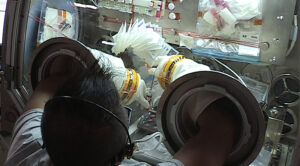Declaración del administrador de la NASA sobre la solicitud de presupuesto del presidente para el año fiscal 2023
Monday, 28 March 2022 16:53 El presupuesto del presidente para el año fiscal 2023 permitiría a la NASA mantener el liderazgo en innovación global de Estados Unidos y mantener a la NASA a la vanguardia de la exploración y el descubrimiento al regresar a la Luna con el programa Artemis, entre otros esfuerzos.
El presupuesto del presidente para el año fiscal 2023 permitiría a la NASA mantener el liderazgo en innovación global de Estados Unidos y mantener a la NASA a la vanguardia de la exploración y el descubrimiento al regresar a la Luna con el programa Artemis, entre otros esfuerzos. Biden’s 2023 defense budget adds billions for U.S. Space Force
Monday, 28 March 2022 16:30
President Biden’s $773 billion budget request for the Defense Department for fiscal year 2023 includes $24.5 billion for the U.S. Space Force
SES orders software-defined replacement satellite from Thales
Monday, 28 March 2022 15:55
SES said March 28 that it ordered a software-defined geostationary satellite from Thales Alenia Space to extend content and connectivity services across Europe, Africa and Asia.
The post SES orders software-defined replacement satellite from Thales appeared first on SpaceNews.
NASA Administrator Statement on President’s FY 2023 Budget Request
Monday, 28 March 2022 14:51 The President’s fiscal year 2023 budget would allow NASA to sustain America’s global innovation leadership and keep NASA at the forefront of exploration and discovery by returning to the Moon with the Artemis program, among other efforts.
The President’s fiscal year 2023 budget would allow NASA to sustain America’s global innovation leadership and keep NASA at the forefront of exploration and discovery by returning to the Moon with the Artemis program, among other efforts. White House requests $26 billion for NASA for 2023
Monday, 28 March 2022 14:50
The Biden administration’s fiscal year 2023 budget proposal seeks nearly $26 billion for NASA, with increases for exploration, Earth science and space technology.
The post White House requests $26 billion for NASA for 2023 appeared first on SpaceNews.
Video: Past, present, and future of women in space
Monday, 28 March 2022 13:06
This year marks the 100th anniversary of the adoption of the 19th Amendment to the U.S. Constitution, guaranteeing women the right to vote. "Past, Present, and Future of Women in Space," is an inspirational program to reflect on the stories and contributions of women in space and STEM through the lens of the past, present, and future.
In addition to special guests, you'll hear from a panel of NASA's own female "firsts" and pioneers, including astronaut Stephanie Wilson; Clara Ma, NASA's Curiosity rover naming contest winner; Charlie Blackwell-Thompson, launch director at Kennedy Space Center; and moderator Dr. Christyl Johnson, Deputy Director for Technology and Research Investments at Goddard Space Flight Center.
Explore further
Tech in Orbit Leads to Breakthroughs on Earth
Monday, 28 March 2022 12:11
Boeing’s Technology in Space program gives a boost to start-ups working on biomedical innovations by funding their experiments on the International Space Station
The post Tech in Orbit Leads to Breakthroughs on Earth appeared first on SpaceNews.
Winning rovers of lunar polar challenge
Monday, 28 March 2022 10:50
The poles of the Moon have emerged as enticing goals for future exploration, given their potential for harbouring water and other volatiles. So ESA and the European Space Resources Innovation Centre, ESRIC, challenged European and Canadian engineering teams to develop vehicles capable of prospecting resources within in these shadowy regions – then put their designs to the test in a realistic lunar analog environment. Five winning teams have now been selected from this challenge, receiving €75 000 contracts each to move their rovers forward to the next phase of the contest.
AFRL CISLunar highway patrol system seeks industry collaboration
Monday, 28 March 2022 10:43 The Air Force Research Laboratory's (AFRL) Space Vehicles Directorate is seeking partners to design and inform the capabilities of the Cislunar Highway Patrol System (CHPS) satellite, to provide space domain awareness beyond Geosynchronous orbit, in the region of the moon that is experiencing increasing activity.
A draft Request for Proposals was posted last week, on the NSTXL.org website,
The Air Force Research Laboratory's (AFRL) Space Vehicles Directorate is seeking partners to design and inform the capabilities of the Cislunar Highway Patrol System (CHPS) satellite, to provide space domain awareness beyond Geosynchronous orbit, in the region of the moon that is experiencing increasing activity.
A draft Request for Proposals was posted last week, on the NSTXL.org website, Advanced Air Mobility looks ahead to automation
Monday, 28 March 2022 10:43 Using software to handle tasks to assist people is not a new concept - look at our computers, cell phones or electric cars.
Advanced Air Mobility, or AAM, aircraft intend to apply that same idea with new software algorithms and hardware such as sensors and radars. Technology like this could enable vehicles to operate without a pilot, or if a pilot is in the loop, increase the safety. Use c
Using software to handle tasks to assist people is not a new concept - look at our computers, cell phones or electric cars.
Advanced Air Mobility, or AAM, aircraft intend to apply that same idea with new software algorithms and hardware such as sensors and radars. Technology like this could enable vehicles to operate without a pilot, or if a pilot is in the loop, increase the safety. Use c GS Yuasa Lithium Power completes PDR of scalable spacecraft battery
Monday, 28 March 2022 10:43 GS Yuasa Lithium Power (GYLP) has announced the successful completion of the Preliminary Design Review (PDR) for a new scalable small form factor battery design. With PDR complete the battery design will now move into the critical design phase.
GYLP's design integrates the recently qualified LSE12x Lithium-ion Cell developed by GS Yuasa Technology LTD (GYT) and seeks to align with smaller
GS Yuasa Lithium Power (GYLP) has announced the successful completion of the Preliminary Design Review (PDR) for a new scalable small form factor battery design. With PDR complete the battery design will now move into the critical design phase.
GYLP's design integrates the recently qualified LSE12x Lithium-ion Cell developed by GS Yuasa Technology LTD (GYT) and seeks to align with smaller Fleet Space Technologies to revolutionise mineral exploration with launch of Geosphere
Monday, 28 March 2022 10:43 GeoSphere is a first-of-its-kind system that combines wireless Geodes, edge computing and a constellation of low earth orbit (LEO) nanosatellites to discover critical resources up to 100 times faster than traditional methods.
It also drastically reduces the requirement for environmentally damaging elements of existing surveyance practices such as the use of explosives, noise machines and d
GeoSphere is a first-of-its-kind system that combines wireless Geodes, edge computing and a constellation of low earth orbit (LEO) nanosatellites to discover critical resources up to 100 times faster than traditional methods.
It also drastically reduces the requirement for environmentally damaging elements of existing surveyance practices such as the use of explosives, noise machines and d Eutelsat and OneWeb sign agreement to address key connectivity verticals
Monday, 28 March 2022 10:43 Eutelsat Communications and OneWeb, the low Earth orbit (LEO) satellite communications company, has announced a global, multi-year Distribution Partnership Agreement (DPA) for OneWeb capacity. The agreement paves the way for Eutelsat to commercialise OneWeb services across key verticals including Maritime, Aviation, Enterprise, Telcos and Government.
The partnership reflects the deepening
Eutelsat Communications and OneWeb, the low Earth orbit (LEO) satellite communications company, has announced a global, multi-year Distribution Partnership Agreement (DPA) for OneWeb capacity. The agreement paves the way for Eutelsat to commercialise OneWeb services across key verticals including Maritime, Aviation, Enterprise, Telcos and Government.
The partnership reflects the deepening China's Tianzhou-2 cargo craft leaves space station core module
Monday, 28 March 2022 10:43 China's cargo spacecraft Tianzhou-2 separated from the core module of the country's space station Sunday afternoon, announced the China Manned Space Agency.
At 3:59 pm Beijing Time, Tianzhou-2 left the core module of the Tiangong space station after completing all of its scheduled tasks, said the agency.
During its operation in orbit, Tianzhou-2 carried out a series of extended appli
China's cargo spacecraft Tianzhou-2 separated from the core module of the country's space station Sunday afternoon, announced the China Manned Space Agency.
At 3:59 pm Beijing Time, Tianzhou-2 left the core module of the Tiangong space station after completing all of its scheduled tasks, said the agency.
During its operation in orbit, Tianzhou-2 carried out a series of extended appli 

